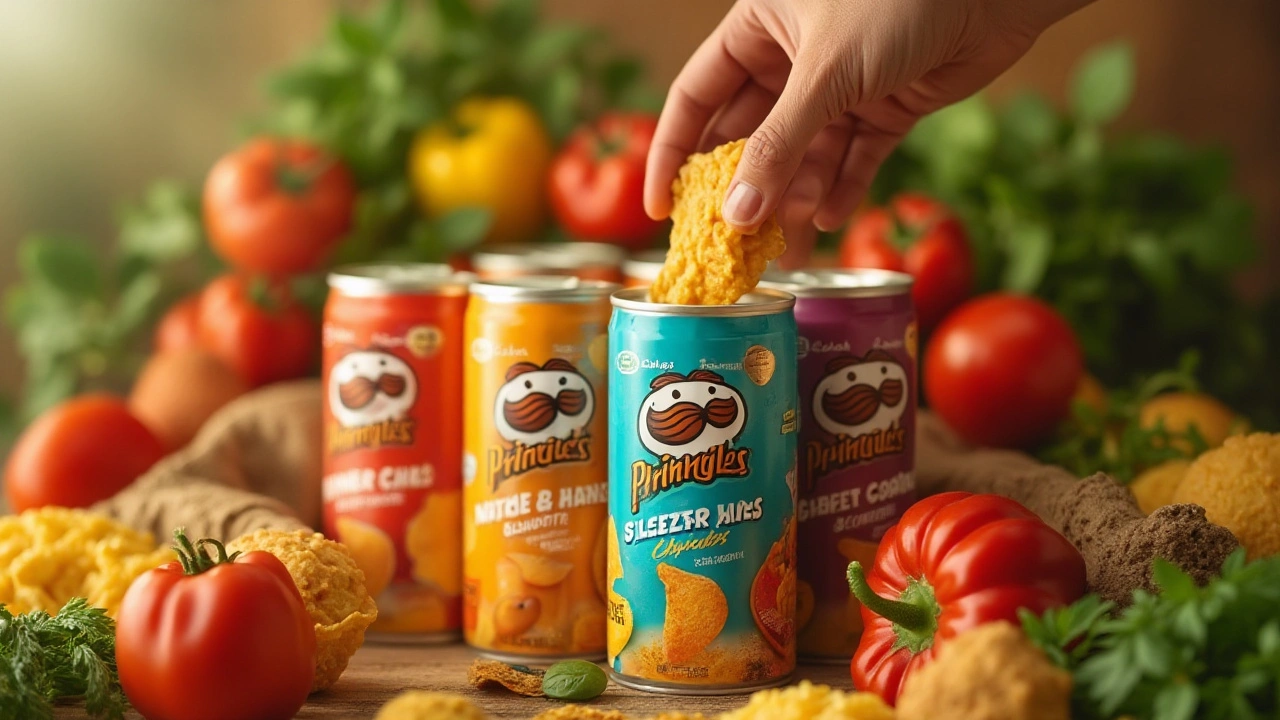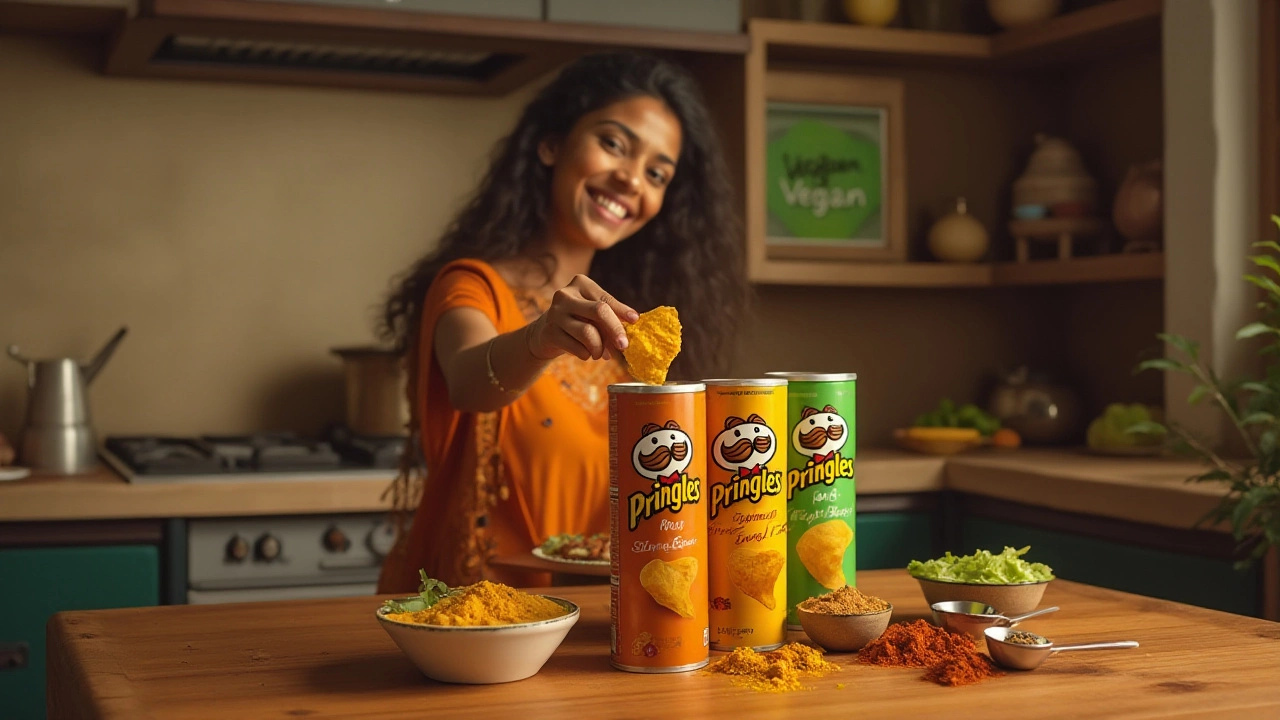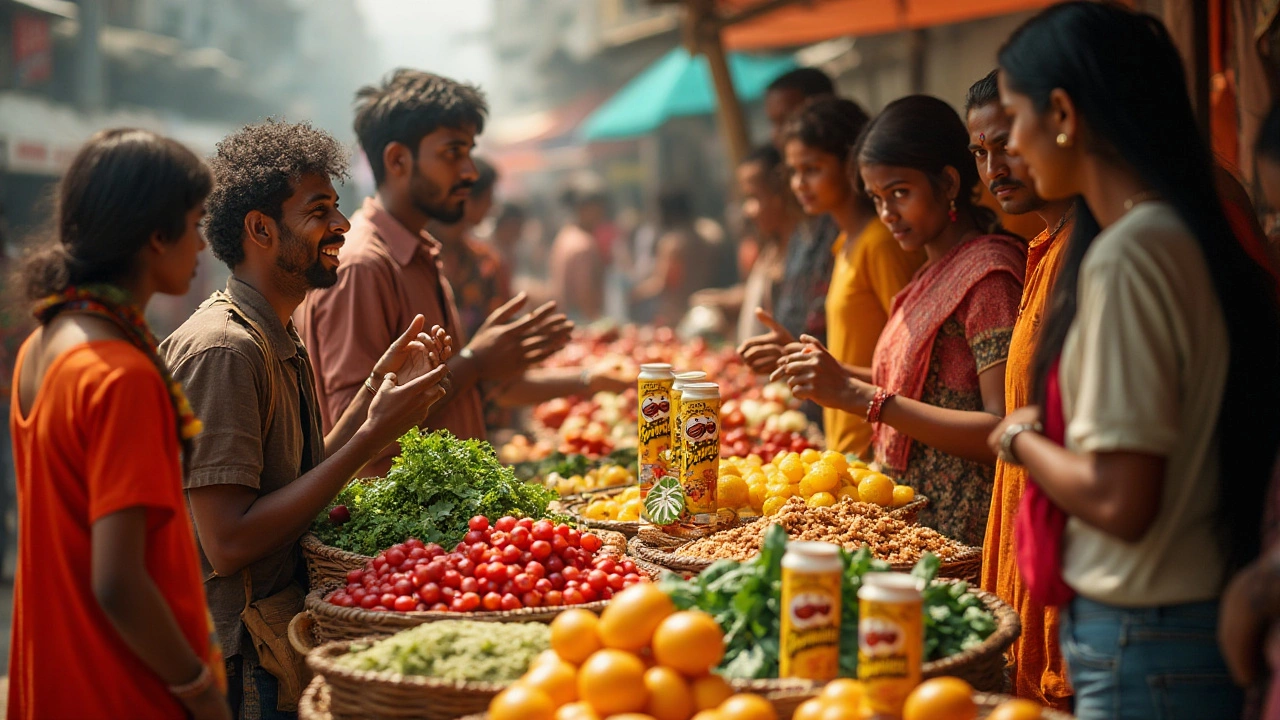Who hasn't grabbed a tube of Pringles on a snack run? These iconic crisps have a unique texture and flavor that makes them stand out in the snack aisle. But if you're vegan or considering a plant-based lifestyle, you might have paused to wonder: are Pringles vegan?
It's a fair question, especially when even the humble potato chip can harbor ingredients that aren't plant-friendly. As we delve into this savory subject, we'll uncover what makes some Pringles flavors fit for a vegan diet and why others miss the mark. So, if you're a snack enthusiast eager to make vegan-friendly choices, let's explore the crunchy world of Pringles together!
- Understanding Pringles Ingredients
- Vegan Flavors of Pringles
- Hidden Non-Vegan Ingredients
- Tips for Choosing Vegan Snacks
Understanding Pringles Ingredients
Delving into the ingredients that make up a tube of Pringles can unveil a lot about its suitability for vegan snacks. At first glance, Pringles might seem just like any other potato chips – made primarily from potatoes and spices. Yet the reality is a bit more complex and intriguing. Pringles are not traditional potato chips; they are crisps made from a blend of dehydrated processed potato. This paste is then shaped into those perfectly stacked curves. But that's just the base of the recipe. The remainder of the ingredients list can vary widely depending on the flavor, introducing numerous additives and flavorings. Such additives often include wheat starch, various vegetable oils, and seasonings that may sometimes bridge the gap into non-vegan territories.
Among those numerous ingredients are various seasoning agents which might be vegan or not. Interestingly, most of the plain flavors, like the Original Pringles, avoid animal-based ingredients, making them suitable for those following plant-based diets. However, ingredients like whey, buttermilk, and cheese powder, which regularly appear in flavors like Sour Cream & Onion or Cheddar Cheese, are definite no-gos for vegans. There’s also room for some ingredients to surprise you; lactic acid, although ominous-sounding, is often derived from vegan sources in snacks like these. But one must always be cautious with the catch-all term “natural flavors” that could potentially be derived from animal sources. A consumer might need to reach out directly to the manufacturer for specifics, especially when living a strict vegan lifestyle.
According to the Vegan Society, "Always be vigilant of hidden animal ingredients in processed foods, especially those marked with vague terms like 'natural flavors'."
Understanding the complex landscape of processed snack components is crucial in making informed dietary choices. Some Pringles flavors might get an ethical thumbs-up simply because they consist of basic components like processed dehydrated potatoes, vegetable oils, and salt. But delve deeper into flavored varieties and you frequently find elements designed to enhance flavor and longevity of the product. For instance, lecithins used in crisps production could be plant-derived from soy, but there are cases where they're animal-based. This requirement for deep scrutiny when purchasing a simple snack can be both vexing and enlightening for the informed consumer.
To make things easier while navigating snack labels, vegans can benefit from knowledge of specific E-numbers. Certain E-numbers are associated with non-vegan additives such as carmine E120, or gelatin-derived E441. Familiarizing oneself with such codes can simplify the snack aisle tour. And it's not just about the ingredients list; being cautious of cross-contamination in production lines labeled as allergen-free, including those without dairy or eggs, could still help avoid animal-based contamination. On a related note, it's worth mentioning that although Pringles are distributed internationally, ingredient lists and formulations may change based on regional regulations and consumer preferences, giving even more reason to scrutinize labels vigilantly.

Vegan Flavors of Pringles
When you find yourself eyeing a colorful stack of Pringles in the snack aisle, your mind might wander to the variety of flavors these chips offer—some of which, to your delight, are perfectly vegan. It’s an interesting twist in the food market that not all potato chips are vegan-friendly, but Pringles has made it easier for those adhering to a plant-based diet to make informed choices.
Presently, several flavors do not contain any animal-derived ingredients. These include the classic Original, which is simply a blend of potatoes, vegetable oils, and seasoning. Their Original flavor maintains its vegan status due to the simplicity of its ingredients, which makes it a reliably savory option for many.
Another flavor that tends to get positive nods from vegan communities is the BBQ version. Unlike some barbeque-flavored snacks that sneak in honey or animal fats, this variant sticks with ingredients like sugar, tomato powder, garlic powder, and a blend of spices to give that smoky sensation while staying true to a vegan commitment. A quick peek at the ingredient list confirms there's no hidden dairy lurking behind the smoky goodness.
A representative from the Pringles team reportedly mentioned, "Our vegan flavors are among our most popular, offering that irresistible crunch and flavor without compromise."
Perhaps surprising to some, the Pringles Paprika flavor is also on the list. This is another fine example where a mix of spices and coloring agents can create a delicious chip without veering into non-vegan territory. Paprika itself is known for its sweet and warm tones, created without animal derivatives, making these chips a flavorful choice for plant-based eaters.
| Flavor | Vegan Status |
|---|---|
| Original | Vegan |
| BBQ | Vegan |
| Paprika | Vegan |
Even the Salted flavor, which adheres to just basic seasoning and oils, provides a reassuringly safe choice. For those exploring beyond just savory, the Rare Pringles Seaweed flavor is often vegan. Seaweed doesn’t just add a blast of umami, but also checks the vegan-friendly box as it’s derived directly from plants.
A crucial piece of advice for anyone navigating the world of vegan snacks is to remain vigilant about reading labels. Manufacturing processes and ingredients can change, and while today’s Paprika might be vegan, tomorrow's might introduce non-vegan ingredients without much fanfare. Always double-check ingredient lists to ensure your snacks align with your dietary values.

Hidden Non-Vegan Ingredients
When you're on the hunt for vegan-friendly snacks, it's not enough to just glance at the packaging and hope for the best. Many processed foods, like Pringles, have ingredient lists that can be unexpectedly tricky to decode, even for the most diligent label readers. Some ingredients disguised under unfamiliar names could be the reason why not all Pringles flavors align with a strict vegan diet. For instance, certain varieties might contain whey, buttermilk, or even flavor enhancers that indirectly come from animal origins.
Take whey, for example. It's a byproduct derived from milk during cheese production, frequently popping up as an ingredient to add richness to snacks. Similarly, lactose, another milk derivative, is sometimes included for a touch of sweetness. One might think a chip is safely plant-based until these sneaky ingredients surface. In addition, flavor enhancers such as monosodium glutamate (MSG) can occasionally include animal-derived components, although MSG itself isn't typically non-vegan. However, the manufacturing process or the sourcing of these ingredients can sometimes be puzzling and opaque.
Another ingredient to watch out for is gelatin, which is made from animal bones and connective tissues. While not commonly found in all Pringles varieties, it occasionally appears in specific seasonal or specialty flavors. Some Pringles are also flavored with real cheese or sour cream, both of which are dairy products that naturally don't make the vegan cut. This makes it crucial for snack enthusiasts to always do a double-check, particularly if the flavor name hints at a cheesy or creamy taste.
"Reading food labels is challenging, but it's an essential skill for those adhering to a vegan lifestyle," advises Dr. Holly Moore, a nutritionist specializing in plant-based diets. "It's important to look beyond the obvious and recognize names that may not initially scream 'animal product.' Many companies are becoming more transparent, but there's still a learning curve for consumers."
Consider cross-contamination too. A snack can be made with only plant ingredients, yet share machinery with non-vegan products. This can lead to traces of milk or other animal products inadvertently slipping in, which, for some, is a dealbreaker. Awareness about these possibilities helps you make choices that truly align with your dietary ethics and preferences.
To ensure the chips you're munching on are truly vegan, it’s often helpful to consult lists of vegan Pringles flavors compiled by reliable vegan bloggers and advocates. These resources frequently update information based on changes in product formulations, allowing you to enjoy your vegan snacks without the stress of hidden surprises. By staying informed, you can enjoy the crunch of a chip without bending your dietary commitments.

Tips for Choosing Vegan Snacks
Finding truly vegan snacks in a market filled with complex ingredient lists can seem like a treasure hunt. However, with a little know-how, making informed choices becomes a breeze. Let's start by understanding that a product being labeled as 'vegan' often implies it’s free from animal products like meat, dairy, eggs, and even honey. Yet, it's not always that simple. Items we wouldn’t necessarily associate with animal products can still contain them due to added flavorings or preservatives.
One of the first things you should do is become an interim label detective. Scan those ingredient lists for sneaky non-vegan culprits. Ingredients such as gelatin, which is often used in gummy candies or marshmallows, and casein, a protein found in milk, are obvious signals. But there are also less expected, often-missed ingredients like isinglass or shellac, derived from fish bladders and insects respectively. Recognizing these terms is key to ensuring your snack is truly vegan.
Consider choosing brands that explicitly label their products as vegan. Certifications like the Vegan Society’s sunflower logo are reliable indicators. This certification guarantees that products have met the rigorous standards for vegan labeling. It’s also worth noting that while not all ‘vegetarian’ products are vegan, many can be, so don’t hesitate to explore these categories either.
The popular chef and food writer, Jamie Oliver, once said, "Understanding the ingredients is the first step toward cooking and eating consciously." This principle is especially relevant to veganism, as the lifestyle prioritizes awareness of every ingredient's source.
Another effective strategy is to explore product reviews and communities. Online forums and reviews can guide you to vegan products that might not be heavily advertised. Often, trusted user reviews will highlight if a product fulfills its vegan promise or if there might be potential concerns regarding ingredients. Pringles vegan enthusiasts can also benefit from these communities by sharing insights about new vegan snacks they discover, expanding everyone’s options.
Lastly, embracing homemade snacks can be rewarding, offering control over ingredients while satisfying cravings. With endless recipes and instructions available online, crafting your own plant-based treats ensures they align perfectly with your dietary needs. Whether it's baking vegan granola bars or concocting a creamy hummus dip, the possibilities are endless and delicious.